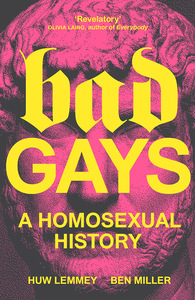You need to sign in or sign up before continuing.
Take a photo of a barcode or cover
informative
medium-paced
While fun in a weird way, I think this book failed to reclaim anything. I failed to see what the early chapters had to do with the narrative because by the narrative’s own admission, there was no “gay” identity, and if there had been, most of the profiles would not have used it. Hadrian, so-called good emperor, was a bad gay because from what I can tell, he acted the way Roman men acted, and society today dislikes it. Saul was a bad gay either for being a prostitute or for testifying in court? Honestly, I’m not sure. While there are a raft of colonizing bad gays—from Casement to Mead—and today we view their actions as bad, this is today’s judgement on actions for which we hardly have the whole picture. And while Johnson and Hoover and Cohn and Fortyn all look like very bad gays from mu point of view, I’m sure there’s someone out there looking through a different lens. I guess what I want yo say is that this book is full of people who made choices you may disagree with and who were gay. It’s important to keep in mind that some of them had no concept of gay and a sexual identity is a recent construct—the authors and take pains to point you’d out—and there’s just a lot of shitty people out there. Some of them are gay and some aren’t. Trying not be a shitty human hopefully keeps us out of a redo of this book 100 years from now
informative
reflective
medium-paced
I have a degree in history and still found this so dry and boring that i gave up a quarter of the way through.
intro and conclusion = 5 starsss. actual stories = ??? this book is so hard to rate because i put it down and let it rot for sooo long and it was only partially the book's fault. it was definitely one i had high hopes for from the politics outlined in the introduction. and the conclusion brought it home. lots of interesting ideas revolving around queerness there. i like when authors acknowledge their particular lens of looking at things, their identity, and when they go out of their ways to challenge that. i like the concept of this book. i hate to admit that the stories themselves bored me and dragged. i didn't care too much beyond the main main main points of each one. i wanted to love all the historical context of each story but it was just hard to hold onto. very interesting nuggets about the political climate in each time frame. wanted to love this book, but it just didn't *hit* and that's okay.
funny
informative
medium-paced
challenging
dark
emotional
funny
informative
medium-paced
informative
lighthearted
reflective
slow-paced
It is beautiful, it is fine, it is the noblest form of affection.
Exciting premise, but unfortunately the content does not live up to it entirely. Don't get me wrong, I really enjoyed reading this; historical non-fiction can only get better when you add some queerness to it! My biggest issue was the lack of diversity in a book about Bad Gays - ironic, I know. The introduction left me under the impression that we would only be exploring white cis gay men, which (although somewhat disappointment) would have been fine by me - the authors are choosing a "niche" (as much as white cis gay men can be a niche) and wanting to do this well - but then we got one woman (Margaret Mead) and one Asian gay man (Yukio Mishima), why couldn't we have had more? Especially as most of the chapters were overwritten and repetitive, at least one more women and some more racial diversity could have been squeezed in.
Another complaint that a lot of other readers had was the unfulfilled promise of the title. Most of the personalities discussed in this book were not "bad", even by the definition presented by the authors at the start of the book. Putting historical figures like Roger Casement in the same discussion as Ronnie Kray seemed odd to me too, as though the actions of both were in any way comparable.
Finally, I had some trouble sinking into the writing. Initially it started off very academic and formal, but, as the book went on, this tone dissolved into more humorous writing (appreciated) and quirky exclamations of "you go girl!" (less appreciated). I think the academic voice could have been somewhat relaxed - none of that hyper technical content sunk into my brain - and a more neutral voice could have been adopted so as not to need to resort to these out-of-place exclamations.
In summary, I did enjoy reading this, but I would perhaps just stick to the podcast.
informative
I just want to say it is unfortunate that this is such a good book because the narrator was putting me to SLEEP
hopeful
informative
reflective
medium-paced







